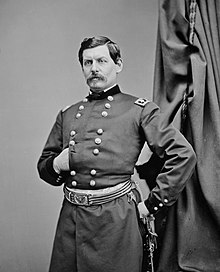General McClellan
| George B. McClellan | |
|---|---|

1861 photograph by Mathew Brady
|
|
| 24th Governor of New Jersey | |
|
In office January 15, 1878 – January 18, 1881 |
|
| Preceded by | Joseph D. Bedle |
| Succeeded by | George C. Ludlow |
| 4th Commanding General of the United States Army | |
|
In office November 1, 1861 – March 11, 1862 |
|
| Preceded by | Winfield Scott |
| Succeeded by | Henry Halleck |
| Personal details | |
| Born |
George Brinton McClellan December 3, 1826 Philadelphia, Pennsylvania |
| Died | October 29, 1885 (aged 58) Orange, New Jersey |
| Political party | Democratic |
| Spouse(s) | Mary Ellen Marcy ("Nelly") McClellan |
| Parents |
|
| Alma mater | United States Military Academy, West Point, New York |
| Profession |
Soldier (General) Politician |
| Signature |  |
| Military service | |
| Nickname(s) | Little Mac The Young Napoleon |
| Allegiance | United States Union |
| Service/branch |
United States Army Union Army |
| Years of service | 1846–1857 1861–1864 |
| Rank | Major General |
| Commands |
Department of the Ohio Army of the Potomac |
| Battles/wars |
Mexican–American War (1846-1848) |
Mexican–American War (1846-1848)
American Civil War (1861-1865)
George Brinton McClellan (December 3, 1826 – October 29, 1885) was an American soldier, civil engineer, railroad executive, and politician. A graduate of West Point, McClellan served with distinction during the Mexican–American War (1846-1848), and later left the Army to work in railroads until the outbreak of the American Civil War (1861-1865). Early in the war, McClellan was appointed to the rank of major general and played an important role in raising a well-trained and organized army, which would become the Army of the Potomac in the Eastern Theater; he served a brief period (November 1861 to March 1862) as general-in-chief of the United States Army / Union Army. McClellan organized and led the Union army in the Peninsula Campaign in southeastern Virginia from March through July 1862. It was the first large-scale offensive in the Eastern Theater. Making an amphibious clockwise turning movement around the Confederate States Army in northern Virginia, McClellan's forces turned west to move up the Virginia Peninsula, between the James and York Rivers landing from the Chesapeake Bay, with the Confederate capital, Richmond, as their objective. Initially, McClellan was somewhat successful against the equally cautious General Joseph E. Johnston, but the military emergence of General Robert E. Lee to command the Army of Northern Virginia turned the subsequent Seven Days Battles into a partial Union defeat.
...
Wikipedia
